This article was co-authored by Chris M. Matsko, MD. Dr. Chris M. Matsko is a retired physician based in Pittsburgh, Pennsylvania. With over 25 years of medical research experience, Dr. Matsko was awarded the Pittsburgh Cornell University Leadership Award for Excellence. He holds a BS in Nutritional Science from Cornell University and an MD from the Temple University School of Medicine in 2007. Dr. Matsko earned a Research Writing Certification from the American Medical Writers Association (AMWA) in 2016 and a Medical Writing & Editing Certification from the University of Chicago in 2017.
There are 22 references cited in this article, which can be found at the bottom of the page.
This article has been viewed 69,145 times.
Mouth ulcers, or canker sores, are inflamed circular or oval patches inside the mouth. Also called aphthous ulcers, they are small, shallow lesions that develop on the soft tissues in your mouth or at the base of your gums. Unlike cold sores, canker sores don't occur on the surface of your lips and they aren't contagious. Their causes are uncertain, but they can be painful and can make eating and talking difficult.
Steps
Easing the Pain Naturally
-
1Decide how long you can wait for pain relief. Some natural remedies are quick and easy to make using ingredients you probably have in your pantry. Others, while easy, may either require ingredients only available at specialty food stores or may take time to prepare.
- Try various home remedies until you find the ones that work for you.
- Be aware of any food allergies or other sensitivities you may have before trying any home remedies. You may also wish to run it by your doctor before you try a home remedy.
-
2Apply ice to the location of the ulcer. This method is the fastest way to pain relief, although the relief may be temporary. Allowing ice chips to slowly dissolve over the sores will temporarily numb the area and may reduce the inflammation.Advertisement
-
3Make an antibacterial salt water rinse. Osmosis occurs when the inside of a cell has a lower salt content than the outside. Water, or excess fluid, is drawn out of the cell and swelling goes down, easing discomfort.[1]
- Salt is an antiseptic, so it will help to keep the area free of bacteria to promote healing.
- Try a baking soda rinse instead, using 1 teaspoon of baking soda dissolved in 1/2 cup warm water.[2]
-
4Make a rinse using dried sage. Sage has long been used in ancient cultures for cleansing and healing of mouth ailments. Mix 2 teaspoons dried sage with 4–8 ounces of fresh water and boil for 10 minutes. Let it cool, then swish the rinse in your mouth for one minute. Spit it out and rinse your mouth with cold water.[3]
- Alternatively,combine a handful of fresh sage with 4–8 ounces of water. Store in an airtight glass jar in a cool dark place for 24 hours. Remove the sage and swish only the infused water in your mouth for one minute.[4]
-
5Make a soothing aloe rinse. Aloe’s sunburn-soothing properties are well known, but this plant can also ease the pain of a canker sore. Mix 1 teaspoon of natural aloe vera gel with 1 tablespoon of water and swish it in your mouth three times a day.
- Be sure to use natural aloe vera gel.
- Try using aloe vera juice as a rinse.[5]
-
6Use healing coconut oil. Coconut oil is an anti-inflammatory, which not only helps with healing, but may reduce pain. Use a cotton swab or clean hands to apply a liberal amount of coconut oil directly onto the mouth ulcer to ease pain and encourage healing.
-
7Make a cayenne pepper “cream.” Cayenne contains capsaicin, a natural chemical that lends the cayenne its “spiciness.” Capsaicin inhibits Substance P, a neurochemical that controls your body’s pain responses.[8] Add warm water to a small amount of ground cayenne pepper to make a thick paste and apply to the sore.[9]
- Use this paste two to three times daily for pain relief.
- Cayenne pepper also promotes saliva production, which can promote oral health and aid in healing the sore.[10]
-
8Chew on anti-inflammatory basil leaves. Research has shown that chewing basil leaves is an effective anti-inflammatory, which may mean that it can reduce swelling and pain of mouth ulcers.[11] To ease pain, chew four to five basil leaves four times a day.
-
9Make a clove oil cotton ball. Clove oil has been shown to numb tissue as well as benzocaine, the topical anesthetic that most dentists use for minor dental procedures.[14] Soak a cotton ball in a mixture of 1/2 teaspoon of olive oil and four to five drops of clove essential oil and apply directly to the sore for five to eight minutes for pain relief.[15]
- Rinse your mouth out with warm water before and after this treatment so that oil can be fully effective.
- Clove oil has a strong taste that some users find unpleasant, and accidental ingestion of too much oil can have side effects.[16]
-
10Apply a soothing chamomile compress. Chamomile tea contains bisabolol, or levomenol, a naturally-occurring chemical compound which can reduce inflammation and, thus, pain.[17] Soak one bag of chamomile tea in warm water for one minute, then place it directly against the sore for five to 10 minutes twice a day.[18]
- Chamomile has been found to soothe the digestive tract and ease gastrointestinal issues, which may be an underlying cause of mouth ulcers.[19]
- You can also try a compress of fresh sage. Combine a handful of fresh sage with 4–8 ounces of water. Store in an airtight glass jar in a cool dark place overnight. Remove the sage and use a mortar and pestle to mash the leaves to a pulp. Apply this mash directly over the sore for five minutes.[20]
- Always rinse your mouth with plain cold water after applying compresses or herbs.
-
11Make a numbing spray using essential oils. Many essential oils have anti-inflammatory properties, and peppermint and eucalyptus may also work as antimicrobial agents to reduce your chances of infection. Additionally, they may reduce swelling due to the astringent nature of these oils, which tightens the surrounding tissues. You might also experience a slight numbing effect due to their cooling properties.[21]
- Combine 2 tablespoons of olive or grapeseed oil, 10 drops of peppermint essential oil, eight drops of eucalyptus essential oil in a mister bottle. Cap and shake well before use.
- Spray the mist, as needed, directly onto the canker sore for pain relief.[22]
Easing the Pain with Medication
-
1Ask your doctor or pharmacist for suggestions. Your doctor knows your medical history and can discuss your options based on your particular situation. Pharmacists are experts in medication and chemistry and can discuss over-the-counter options for pain relief.
- Always contact your doctor or pharmacist before using any medication for non-approved purposes, even if it seems safe.
- Be sure to keep all of the safety and information documents that come with your purchase, so that you can check for side effects and dosages.
-
2Apply Milk of Magnesia directly to your canker sore. Milk of Magnesia may provide some pain relief if you apply some to your canker sore a few times a day, as needed. You can also try holding the Milk of Magnesia or Maalox in your mouth to wash and coat the sore for some relief of swelling and inflammation.[23]
- You can also try brushing your teeth using a soft brush and toothpaste free of foaming agents, such as Biotene or Sensodyne. ProNamel.[24]
-
3Try topical benzocaine. This numbing medication is sometimes used to ease the pain when a baby is teething, though the FDA now recommends against it. If you follow the dosages correctly, however, you can also use the gel on a canker sore to numb the pain.[25]
- During application to your mouth or gums, avoid swallowing the medication.
- After application, you should avoid eating for an hour.
- There is a risk for a rare but life-threatening side effect of this kind of medication called methemoglobinemia. This condition reduces the amount of oxygen in your blood stream to dangerously low levels.[26]
-
4Apply an approved over-the-counter medicine containing pain-relieving ingredients. These drug ingredients have been approved for pain relief and may help ease your pain quickly. They may even help with healing, if applied soon after the appearance of a mouth ulcer.[27]
- Benzocaine-containing products numb the area temporarily, easing discomfort.
- Fluocinonide is an anti-inflammatory that may help with pain relief as the inflammation is reduced.
- Hydrogen peroxide, as an ingredient in medicine, works as an antimicrobial agent, preventing infection and promoting healing, although it should never be used alone.
-
5Ask your doctor for prescription mouth rinse to heal the sore. Contact your doctor if you’re having trouble brushing your teeth or eating because of the pain of a mouth ulcer. She can prescribe a medicated substance to put on the sore to help the healing process, which will also alleviate your pain.
- Antimicrobial mouthwashes help kill bacteria, viruses or fungi that could infect the ulcer. Keeping your mouth clean will help the ulcer to heal and will lessen the pain.[28]
- Benzydamine, available as a mouthwash or spray, offers local anaesthetic (numbing) and anti-inflammatory properties for pain relief. Note that this mouthwash should not be used for children under 12 years of age and you shouldn’t use it for more than 7 days.[29]
-
6Ask your doctor for a more powerful medication if you have several sores. These medications for mouth ulcers are usually a last resort, but your doctor may prescribe a mouth rinse containing corticosteroid. These medications are anti-inflammatories and can offer powerful pain relief.
- These medications may not be safe for children under 12.
- Ask your doctor about the potentially serious side effects of corticosteroids.[30]
-
7Talk with your doctor about a cautery of your sore. If your ulcer is extremely large and or painful, you and your doctor may consider a cautery. For this procedure, an instrument or chemical substance is used to burn, sear or destroy the tissue to potentially reduce healing time.
- Debacterol, a topical solution created to treat canker sores and gum problems, may reduce healing time to about a week.
- Silver nitrate, another chemical solution, may not speed the healing process, but can ease the pain of a mouth ulcer.[31]
Easing the Pain with Lifestyle Changes
-
1Talk with your doctor about your health and diet choices that may be causing your mouth ulcer. Knowing the underlying causes may help you find the best pain remedy, as well as help you to prevent future canker sores.
- Sodium lauryl sulfate, an ingredient in many toothpastes and mouth rinses, may cause a reaction in your mouth which leads to a canker sore.
- Food sensitivities to things like chocolate, coffee, strawberries, eggs, nuts, cheese, and spicy or acidic foods or a diet lacking in vitamin B-12, zinc, folate (folic acid) or iron may cause canker sores.
-
2Protect your mouth from traumatic injury. Minor, localized injuries to your mouth, such as biting the inside of your cheek, a sports accident, or brushing your teeth too vigorously, may inflame the tissue and cause an ulcer.
- Wear a mouthguard during contact sports to prevent accidental cheek biting or other damage from your teeth.
- Use only a toothbrush with a soft head to brush your teeth.
-
3Talk with your doctor about your overall health. Some diseases and conditions, such as celiac disease, inflammatory bowel disease, Behcet’s disease, and various autoimmune disorders may make you more prone to mouth ulcers. Ask your doctor for more ways to prevent mouth ulcers in your circumstances.[32]
-
4Make a wax “cap” for sharp teeth or dental devices. Sometimes a misaligned or sharp tooth, or dental implements such as braces or dentures, rub against the inside of your cheek, irritating your canker sore. A homemade wax “cap” can protect ease the pain by protecting the sore from that friction.
- Melt 1 tablespoon of beeswax and 2 teaspoons of coconut oil together. After it has cooled, press a small amount over the area of your tooth or dental devices that rubs the sore.
- If you have braces, use enough wax that it creates an actual barrier, rather than just pushed into and around the brace.
-
5Visit your dentist to repair a sharp tooth or filling. If the canker sore has been caused by a sharp tooth or filling irritating the inside of your cheek, you should feel relief as soon as you seek treatment.[33]
- Your dentist will tell you if you are a candidate for recontouring. If your enamel is too thin, any filing may cause sensitivity to temperature that may be painful.[34]
- Your dentist can "recontour" your teeth by removing tiny bits of enamel with a sanding disc or a fine diamond burr. He or she will shape and smooth the sides with sandpaper, and then will polish your tooth or teeth.[35]
-
6Reduce your stress. Some research shows an increase in canker sores as stress levels increase. Try adding relaxing activities to your routine such as yoga, meditation, or exercise.[36] [37]
Expert Q&A
-
QuestionIs it possible for the canker sore to grow larger?
 Chris M. Matsko, MDDr. Chris M. Matsko is a retired physician based in Pittsburgh, Pennsylvania. With over 25 years of medical research experience, Dr. Matsko was awarded the Pittsburgh Cornell University Leadership Award for Excellence. He holds a BS in Nutritional Science from Cornell University and an MD from the Temple University School of Medicine in 2007. Dr. Matsko earned a Research Writing Certification from the American Medical Writers Association (AMWA) in 2016 and a Medical Writing & Editing Certification from the University of Chicago in 2017.
Chris M. Matsko, MDDr. Chris M. Matsko is a retired physician based in Pittsburgh, Pennsylvania. With over 25 years of medical research experience, Dr. Matsko was awarded the Pittsburgh Cornell University Leadership Award for Excellence. He holds a BS in Nutritional Science from Cornell University and an MD from the Temple University School of Medicine in 2007. Dr. Matsko earned a Research Writing Certification from the American Medical Writers Association (AMWA) in 2016 and a Medical Writing & Editing Certification from the University of Chicago in 2017.
Family Medicine Physician Yes, it is possible for a sore to grow larger in size. If you are having bleeding or it is getting bigger, I would seek out the attention of a medical professional.
Yes, it is possible for a sore to grow larger in size. If you are having bleeding or it is getting bigger, I would seek out the attention of a medical professional. -
QuestionHow long do canker sores last?
 Chris M. Matsko, MDDr. Chris M. Matsko is a retired physician based in Pittsburgh, Pennsylvania. With over 25 years of medical research experience, Dr. Matsko was awarded the Pittsburgh Cornell University Leadership Award for Excellence. He holds a BS in Nutritional Science from Cornell University and an MD from the Temple University School of Medicine in 2007. Dr. Matsko earned a Research Writing Certification from the American Medical Writers Association (AMWA) in 2016 and a Medical Writing & Editing Certification from the University of Chicago in 2017.
Chris M. Matsko, MDDr. Chris M. Matsko is a retired physician based in Pittsburgh, Pennsylvania. With over 25 years of medical research experience, Dr. Matsko was awarded the Pittsburgh Cornell University Leadership Award for Excellence. He holds a BS in Nutritional Science from Cornell University and an MD from the Temple University School of Medicine in 2007. Dr. Matsko earned a Research Writing Certification from the American Medical Writers Association (AMWA) in 2016 and a Medical Writing & Editing Certification from the University of Chicago in 2017.
Family Medicine Physician Although they are painful, canker sores are not long-lasting. They tend to clear up in a week or two.
Although they are painful, canker sores are not long-lasting. They tend to clear up in a week or two.
Warnings
- Don't pick at or bite the ulcer; it will only irritate the tissue and cause further pain and a longer recovery time.⧼thumbs_response⧽
- Ulcers lasting more than three weeks may be a sign of a more serious problem. Call your doctor if a sore lasts longer than three weeks.⧼thumbs_response⧽
- Read all warning on any medications as some are not safe for children, or women who are pregnant, breastfeeding, or trying to get pregnant.[39] [40]⧼thumbs_response⧽
- Some web sites encourage the use of lemons to alleviate the pain of ulcers, but most research shows that the citric acid of the fruit does more harm than good.[41]⧼thumbs_response⧽
- If your ulcer does not cause pain but remains in your mouth for more than a few days, contact your doctor soon, as it may be a sign of oral cancer.[42]⧼thumbs_response⧽
References
- ↑ http://everydayroots.com/canker-sore-remedies
- ↑ http://www.mayoclinic.org/diseases-conditions/canker-sore/basics/lifestyle-home-remedies/con-20021262
- ↑ http://everydayroots.com/canker-sore-remedies
- ↑ http://everydayroots.com/canker-sore-remedies
- ↑ https://www.deltadentalins.com/oral_health/mouthsores.html
- ↑ http://everydayroots.com/canker-sore-remedies
- ↑ https://www.thehealthsite.com/diseases-conditions/5-home-remedies-for-mouth-ulcers-86553/
- ↑ http://www.webmd.com/fibromyalgia/guide/fibromyalgia-causes
- ↑ http://everydayroots.com/canker-sore-remedies
- ↑ http://www.globalhealingcenter.com/natural-health/benefits-of-cayenne-pepper/
- ↑ http://www.dailymail.co.uk/health/article-1216278/How-eating-fresh-basil-help-banish-arthritic-aches-pains.html
- ↑ http://well.blogs.nytimes.com/2011/02/17/remedies-clove-oil-for-tooth-pain/?_r=0
- ↑ https://www.thehealthsite.com/diseases-conditions/5-home-remedies-for-mouth-ulcers-86553/
- ↑ http://www.ncbi.nlm.nih.gov/pubmed/16530911
- ↑ http://everydayroots.com/canker-sore-remedies
- ↑ http://well.blogs.nytimes.com/2011/02/17/remedies-clove-oil-for-tooth-pain/
- ↑ http://www.ncbi.nlm.nih.gov/pmc/articles/PMC2995283/
- ↑ http://everydayroots.com/canker-sore-remedies
- ↑ http://www.ncbi.nlm.nih.gov/pmc/articles/PMC2995283/
- ↑ http://everydayroots.com/canker-sore-remedies
- ↑ http://everydayroots.com/canker-sore-remedies
- ↑ http://everydayroots.com/canker-sore-remedies
- ↑ http://www.pitt.edu/~cjm6/s98canker.html
- ↑ http://www.mayoclinic.org/diseases-conditions/canker-sore/basics/lifestyle-home-remedies/con-20021262
- ↑ http://www.drugs.com/mtm/benzocaine-topical.html
- ↑ http://www.fda.gov/Drugs/DrugSafety/ucm250024.htm
- ↑ http://www.mayoclinic.org/diseases-conditions/canker-sore/basics/treatment/con-20021262
- ↑ http://www.nhs.uk/Conditions/Mouth-ulcer/Pages/Treatment.aspx
- ↑ http://www.nhs.uk/Conditions/Mouth-ulcer/Pages/Treatment.aspx
- ↑ http://www.nhs.uk/Conditions/Mouth-ulcer/Pages/Treatment.aspx
- ↑ http://www.mayoclinic.org/diseases-conditions/canker-sore/basics/treatment/con-20021262
- ↑ http://www.mayoclinic.org/diseases-conditions/canker-sore/basics/causes/con-20021262
- ↑ http://www.nhs.uk/Conditions/Mouth-ulcer/Pages/Treatment.aspx
- ↑ https://my.clevelandclinic.org/health/treatments_and_procedures/hic_Recontouring_of_the_Teeth
- ↑ https://my.clevelandclinic.org/health/treatments_and_procedures/hic_Recontouring_of_the_Teeth
- ↑ http://kidshealth.org/teen/diseases_conditions/mouth/canker.html#
- ↑ https://www.deltadentalins.com/oral_health/stressed_out.html
- ↑ http://kidshealth.org/PageManager.jsp?lic=1&ps=307&cat_id=20086&article_set=22064
- ↑ http://www.nhs.uk/Conditions/Mouth-ulcer/Pages/Treatment.aspx
- ↑ http://www.fda.gov/Drugs/DrugSafety/ucm250024.htm
- ↑ http://www.webmd.boots.com/oral-health/guide/mouth-ulcers
- ↑ https://www.thehealthsite.com/diseases-conditions/5-home-remedies-for-mouth-ulcers-86553/
About This Article
To stop a mouth ulcer from hurting, apply an ice pack to the location of the ulcer to temporarily numb the area and reduce the inflammation. Additionally, try mixing 1 teaspoon of salt with half a cup of warm water and using this to rinse your mouth, since it will reduce swelling and keep the area free of bacteria. Another way to ease the pain from a mouth ulcer is to apply a liberal amount of coconut oil directly to it, since coconut oil is an anti-inflammatory and encourages healing. If you frequently suffer from mouth ulcers, you should speak to your doctor since you may have an underlying food sensitivity. For more advice from our Medical co-author, including how to use chamomile tea to soothe an ulcer, keep reading!





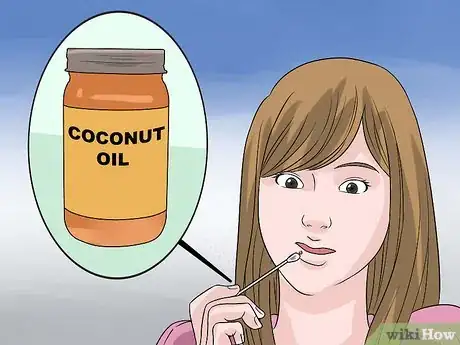
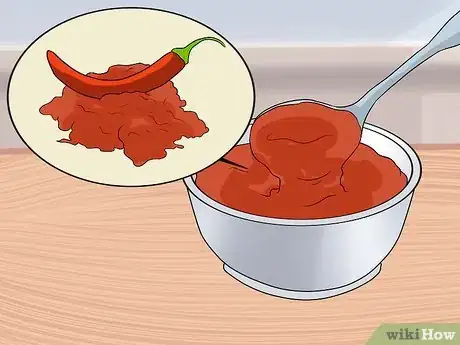

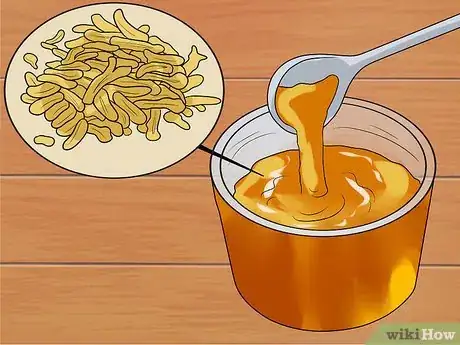
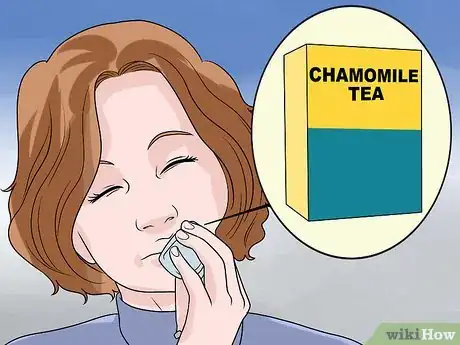








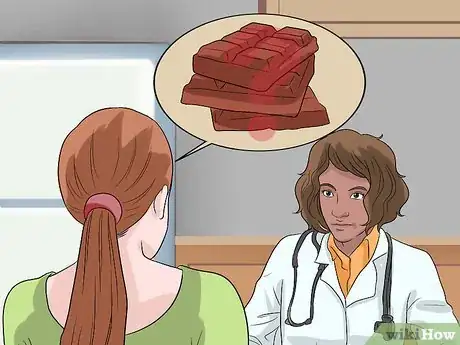



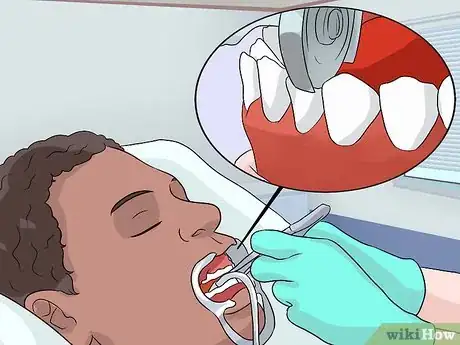
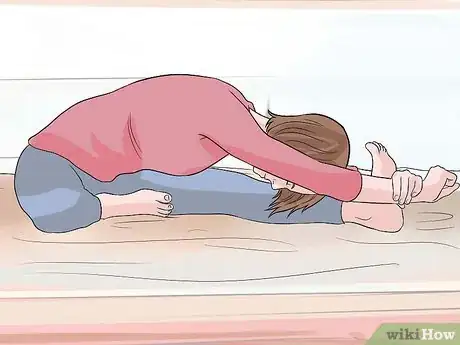

-Step-22.webp)

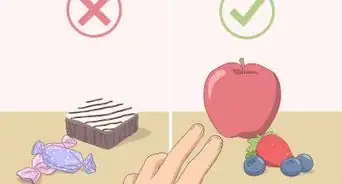



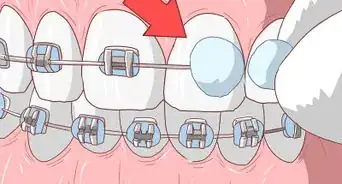















-Step-22.webp)





































Medical Disclaimer
The content of this article is not intended to be a substitute for professional medical advice, examination, diagnosis, or treatment. You should always contact your doctor or other qualified healthcare professional before starting, changing, or stopping any kind of health treatment.
Read More...